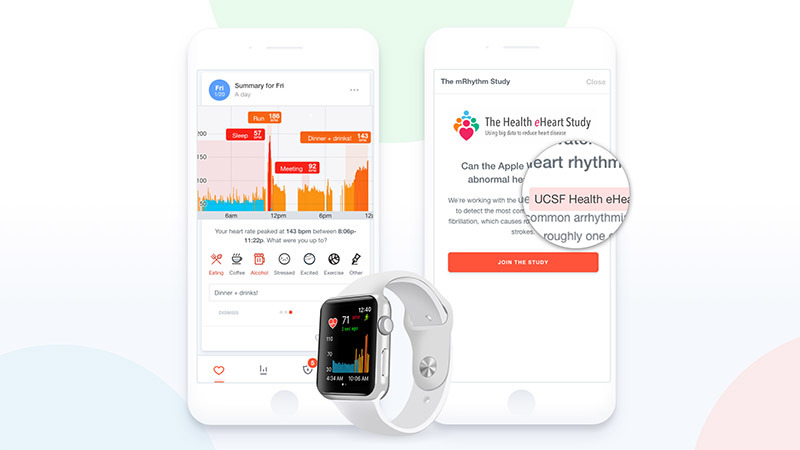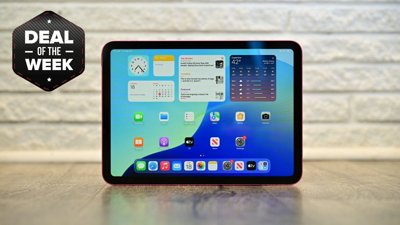New research conducted by the University of California, San Francisco, in collaboration with Apple Watch app Cardiogram, shows Apple Watch's heart rate sensor can aid in the detection of atrial fibrillation, a common heart arrhythmia that can lead to stroke.
As part of ongoing research, a deep neural network was trained and paired with Apple Watch's heart rate sensor to automatically distinguish atrial fibrillation from normal heart rhythm in a pool of test patients. Findings were presented at the Heart Rhythm Society's Heart Rhythm 2017 conference on Thursday.
To train the DNN, researchers collected data — 139 million heart rate measurements and 6,338 mobile ECGs — from 6,158 Cardiogram app users enrolled with the UCSF Health eHeart Study.
Explaining the process to AppleInsider, Cardiogram cofounder Brandon Ballinger said about 200 participants with diagnosed paroxysmal atrial fibrillation took part in the study. These patients were provided a mobile electrocardiogram and tasked with taking one reading per day, or when they felt an onset of symptoms ranging from lightheadedness to heart pains. Cardiogram staff used the gathered information to train the DNN, which was subsequently paired with Apple Watch heart rate data to identify AF.
The DNN was recently validated against a test sample of 51 patients scheduled to undergo treatment. Each person wore an Apple Watch for 20 minutes before and after cardioversion, a procedure that restores normal heart rhythms to patients with arrhythmias.
When compared against a 12-lead electrocardiogram reference, the resulting Apple Watch and DNN solution was found capable of identifying AF with an accuracy of 97 percent, sensitivity of 98 percent and specificity of 90.2 percent, all high marks compared to past detection algorithms.
"Our results show that common wearable trackers like smartwatches present a novel opportunity to monitor, capture and prompt medical therapy for atrial fibrillation without any active effort from patients," said the report's senior author Gregory M. Marcus, MD, MAS Endowed Professor of Atrial Fibrillation Research and Director of Clinical Research for the Division of Cardiology at UCSF. "While mobile technology screening won't replace more conventional monitoring methods, it has the potential to successfully screen those at an increased risk and lower the number of undiagnosed cases of AF."
At its heart, the project seeks to address AF through the use of common consumer devices. Currently, medical devices like Holter Monitors and wireless patches can monitor patient heart rhythms for 24 hours to 4 weeks, but these methods could take some 84 days to detect the first signs of AF. With the right software, new wearable technology like Apple Watch and other devices with accurate heart rate sensors can provide healthcare professionals with a more effective means of monitoring patients on a long-term basis.
The study builds on research first published last March. At the time, Cardiogram cofounders Ballinger and Johnson Hsieh were in the process of creating a preliminary machine learning algorithm capable of detecting AF using consumer grade heart rate sensors.
Ballinger and his team at Cardiogram are currently validating the DNN against a series of industry standards with plans to incorporate results into the app. Looking ahead, Cardiogram is investigating whether the DNN can be applied to other heart conditions.
 Mikey Campbell
Mikey Campbell







-m.jpg)






 Marko Zivkovic
Marko Zivkovic
 Wesley Hilliard
Wesley Hilliard
 Christine McKee
Christine McKee
 Malcolm Owen
Malcolm Owen

 William Gallagher
William Gallagher






-m.jpg)



21 Comments
This is what makes me think about getting Apple Watch but I am waiting for next generation.... I want it to monitor my sleep as well.
Monitoring sleep would be a really nice feature to have but the ability to monitor blood glucose would IMHO be a game-changer.
Apple already dominates the wearable market. If the Apple Watch becomes the de facto wearable medical device then the sky is the limit. Heart patient, diabetes patient, whatever, walks into their doctor’s office. The doctor writes a prescription for an Apple device specifically designed for the purpose, and Medicare pays for it like they pay for other necessary medical devices like oxygen tanks and the like. Or Apple licenses the technology to approved medical device manufacturers. The device uses AI and will notify the doctor’s office when an event occurs and send a quick analysis along too. It might also call 911 and request medical assistance. The imagination goes wild with the possibilities.
You don't need to wait for that. (note: just a satisfied customer) The apps HeartWatch and AutoSleep include Apple Watch apps. I use these to check my heartrate at any point (with much better history display than the Apple app) and AutoSleep tells me how long I've slept and the quality of that sleep (using the watch accelerometer to detect when I've gone to sleep so I don't have to do anything). With my old series 1 watch, I charged in either mornings or evenings so I could sleep with it. With this new 42mm series 2, I only have to charge every 2.5 days... Note: Just finished my Dr. checkup. At the point where my only options are to go on to insulin or completely change my lifestyle with exercise and dropping most the carbs. I still think I'll get 1.5 days out of my S2 (S1 was 1.5 days with no exercise). i do NOT want to go on to insulin.